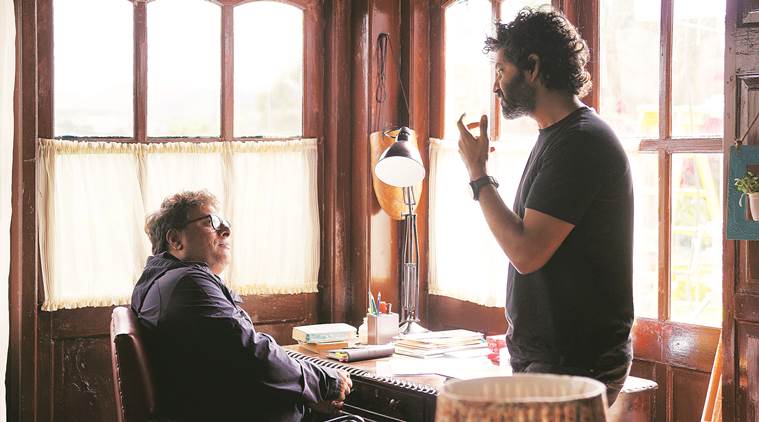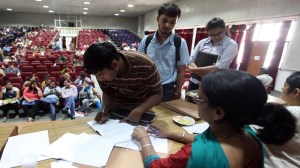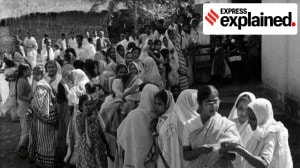- India
- International
Tigmanshu Dhulia on directing web series Out of Love, the problem with student politics
The director talks about the transformation in student politics, his latest web series Out of Love and how digital platforms enable immersive storytelling.
 Tigmanshu Dhulia (seated) on the sets of Out of Love.
Tigmanshu Dhulia (seated) on the sets of Out of Love.
Given that Out of Love (Hotstar) is your fourth web project, would you say that you’ve adapted well to the digital platform?
There’s immense independence — I am not just commenting on the censorship bit. As a creator, I am able to create a world, which is very detailed. In a film, you are limited by a three-hour structure and a plot which is limited to a maximum of three acts. A web show is where you actually take audiences into a world. Had Out of Love been a film, we would not have been able to let things simmer because of time constraints. Cracks don’t appear overnight in a relationship, there is a whole process to it, which I, as a storyteller, am able to convey in the web space. In something like Peaky Blinders (2013), or Narcos (2015), the world that they show is integral to the plot and the story.
What made you tell the story from Meera’s (Rasika Duggal) perspective?
When trying something new, there is the risk that you might fail. This is a story of infidelity, a very mature and adult theme, which I had touched upon in Sahib, Biwi aur Gangster (2011). But that space was different. I wanted to tell the story in a very objective fashion, and not pass any judgment. After we reach a certain age, these things happen, people falter, and they do cross the line. A relationship is healthy only if you are true in it, and true to your partner. If your partner falters, and they confront you, you own it and accept it. The male protagonist, Akarsh (Purab Kohli), never owns up to it, never accepts it. He keeps lying to his wife. And he never understands that she is the one running the house, and keeping his business afloat. He is spineless. But Meera is never the victim. We didn’t want to create another Arth (1982), she is not the beleaguered wife, as Shabana Azmi was.
How important was the setting, Coonoor, to the story?
In a hill station, the locals, who have been living there for ages, are really familiar with each other. And that setting is integral to Meera’s sense of betrayal, as everyone knew the secret (about her husband’s infidelity) except her. The story wouldn’t have worked in Delhi and Mumbai, as in these cities, people hardly know each other.

With Haasil (2002), you became one of the few contemporary filmmakers to explore student politics. Given what is happening in JNU, BHU and other universities, would you revisit it?
I have another project on the same subject. It’s an upcoming web series called Garmi. While doing research for it, I revisited these old universities. JNU has issue-based politics, and I hope it stays that way for the larger good of the country. But the things that we depicted in Haasil don’t exist anymore, as I found out. As for the BHU case, I am very disappointed by the protests against the appointment of a Muslim professor to teach Sanskrit.
The problem is deshwaasi kharaab ho gaye hain (Indians have gone on the wrong track). Agar desh kharaab hota hai (if the country is on the wrong track), that is okay. [One can argue that] economic policies change hongi, toh desh bhi theek ho jayega paanch-dus saal mein (if the economic policies change, then the country will also change in five-ten years). But the problem is serious when the people change, what can we do about that?
What has changed in student politics?
Now, everyone is in it for the money. All central universities get government funds. All the junior leaders of student unions have become sub-contractors, and people in positions like joint secretary, general secretary, are in the game to facilitate contracts, for furniture repairs, CCTV installation, laboratory maintenance, etc. All this amounts to crores of rupees. The driving force for most of them is to become the student union president and then make sure that their favourite contractor gets the tenders (for work). They themselves, of course, make money in the process.
Apart from this, whatever politics they practise is caste-based. The drive to actually do things for the student body at large — address issues like sexual harassment, improvement of facilities and fee hikes — is largely missing.
Would you say that students’ participation in politics is often discouraged?
That’s because students are practising the wrong kinds of politics — very divisive, caste-based, and using it to further their own agenda. Student life is one of the most important phases of one’s life. Imagine a 17-18-year-old boy from a relatively small town, who has enrolled (in university) for a Bachelor of Arts degree. He should be encouraged to feel new things, read new books, be passionate about life, and, yes, be empathetic. As you age, of course, life takes its toll, but if you cannot be idealistic when you are young, what’s the point?
Many of your films were set in small towns. Now, with every other film set in a Kanpur, Bareilly and Agra, do you think we have reached a saturation point?
Small towns have been integral to our cinematic narratives. But the 2000s were a watershed: we saw the demise of the formulaic scripts. While big producers took big blockbusters overseas for money, many turned inwards, hence the resurgence of small-town narratives. Filmmakers like Imtiaz (Ali), Anurag (Kashyap) and Vishal (Bhardwaj) brought those stories from the towns they came from.
As for saturation, I don’t think we have reached there yet, because small towns and villages are where the conflict is. If you wish to explore the impact and effect of anything new in the country, go to the small towns. Be it a new app, or even a new trend, that’s where you catch it. And till the time there is conflict, there will be narratives.
This article appeared in the print edition with the headline ‘If the young can’t be idealistic, what’s the point’
Apr 24: Latest News
- 01
- 02
- 03
- 04
- 05






































